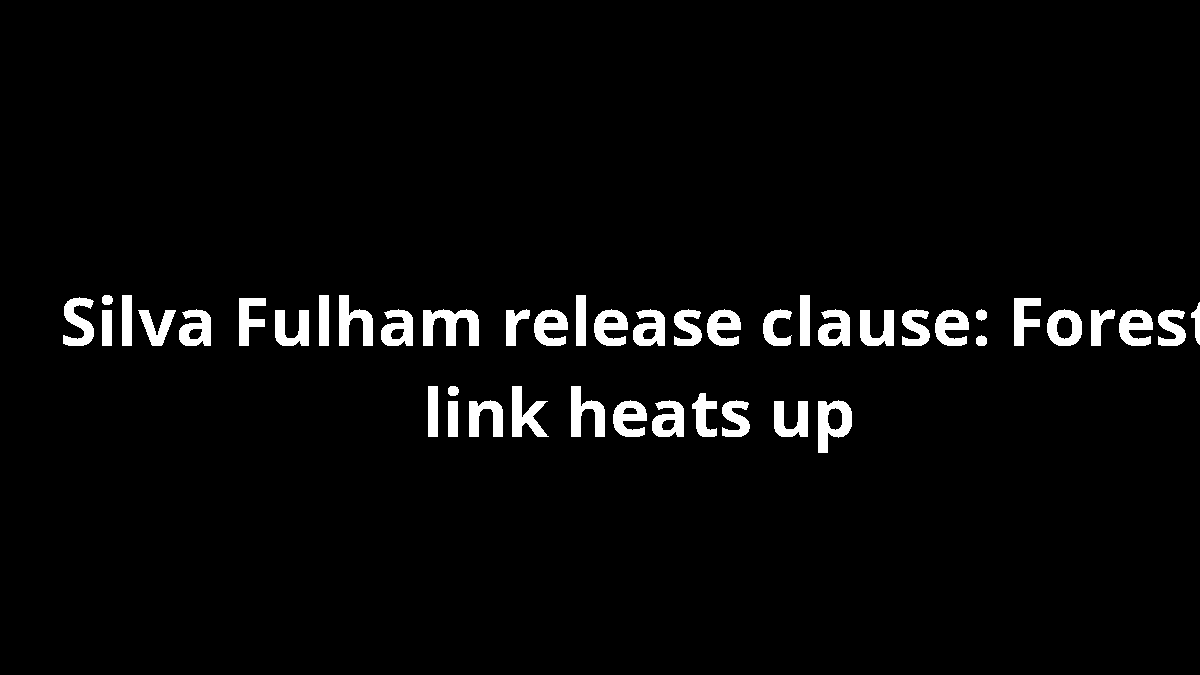Silva Fulham release clause: Forest link heats up
Weekend transfer chatter has intensified around Marco Silva’s future at Fulham, and the spotlight has shifted to the Silva Fulham release clause. The talk centers on a potential buyout around £8 million, a figure that could reshape how clubs price managers who stabilise mid-table squads. The Silva Fulham release clause is repeatedly cited by papers as a barometer of value for a Premier League coach with proven top-flight credentials. The Silva Fulham release clause, if genuine, would place Silva in a market segment occupied by managers who have demonstrated tactical versatility and squad development under pressure. Meanwhile, Fulham’s board will weigh the risks of a sudden departure against the need for continuity that has helped the team punch above expectations. The Silva Fulham release clause has become a talking point for pundits who argue that clauses can act as both a shield and a signal in the high-stakes transfer market. For context on how clauses function in elite sport beyond football, see the ongoing discussions in rugby circles via World Rugby and BBC Sport Rugby.
In the broader landscape, the Silva Fulham release clause is being discussed alongside weekend rumours about Nottingham Forest, who are reportedly weighing a bold bid. The Silva Fulham release clause casts a light on how clubs price ambition and risk. If £8 million is validated, it signals a willingness to reposition valuation for a manager who has overseen a clear uplift in Fulham’s approach. The Silva Fulham release clause, then, becomes a lens on both the club’s long-term planning and its appetite for change. As always, no official confirmation has come from Fulham or Silva, and the story remains within transfer chatter and media speculation rather than formal statements. For readers seeking broader perspective on contract clauses in sport, consult World Rugby’s governance materials and related reporting at BBC Sport Rugby.
Indeed, the current chatter highlights how a release clause can influence negotiations, timing, and competing bids. The Silva Fulham release clause is central to that debate, illustrating how a fixed price can either accelerate a deal or deter interest depending on competing priorities. Meanwhile, observers note that Fulham’s management, academy pipeline, and recruitment strategy could be tested if the clause is triggered. The Silva Fulham release clause—reiterated in multiple outlets—remains a focal point for fans and analysts watching a window of opportunity that could alter Fulham’s trajectory for seasons to come. BBC Sport Rugby and World Rugby offer insights into how clauses function in other sports, underscoring that the mechanics have both similarities and important differences across disciplines.
Marco Silva’s Fulham Release Clause Revealed
What the reports say
The central claim in several weekend roundups is that a Silva Fulham release clause exists and is pegged at a level that could attract serious attention. The Silva Fulham Release Clause, as reported, is framed by journalists as a transfer lever rather than a straightforward exit fee. Supporters of Silva point to Fulham’s growth under his guidance, noting how the club has stabilised and improved compactly in transition last season. Critics, however, warn that a clause of this nature could complicate negotiations, particularly if targets in the transfer market start scrutinising it closely. The Silva Fulham release clause, regardless of its final form, illustrates how market signals shape conversations ahead of a window when strategic moves are commonplace. World Rugby provides context on how governance approaches such mechanisms in different sports, reminding readers that price points are often as much about psychology as about pure mathematics.
Historical context and risk
Contractual clauses in football have evolved, with clubs increasingly using buyout-like mechanisms to ensure continuity or to test the market. The Silva Fulham release clause is the latest example of a modern coaching contract feature that can influence both a manager’s willingness to stay and a club’s readiness to move on. Fulham’s leadership would be expected to balance loyalty and competitiveness, particularly as Silva has helped cultivate a recognisable style and a younger progressive squad. The Silva Fulham release clause, if real, would add a layer of complexity to any potential negotiations, including considerations around contract length, performance incentives, and staff retention. As always, any public statements from Fulham or Silva should be awaited with caution until official confirmation is provided. Readers can explore related contract frameworks at BBC Sport Rugby for cross-sport comparison and World Rugby for governance guidance.
- How a clause interacts with squad planning
- Implications for coaching continuity and recruitment
- Club transparency and fans’ trust
Projections for Fulham
Fulham’s ownership structure and long-term plan would be tested by any credible bid tied to the Silva Fulham release clause. In such scenarios, clubs typically weigh the immediate on-pitch benefits against the strategic cost of rebuilding after a departure. If the clause is activated, Fulham would need to identify a viable successor who can preserve the current trajectory while injecting new ideas. The Silva Fulham release clause, therefore, is more than a number; it is a signal about how aggressive the club plans to be in a competitive landscape where even mid-table teams must respond quickly to evolving threats. For fans seeking further corroboration of these dynamics, see the ongoing rugby governance discussions in World Rugby and the analytical pieces at BBC Sport Rugby.
£8 Million Buyout: Implications for Fulham and Silva
Financial and strategic implications
If the widely cited £8 million figure is accurate, the buyout would sit at a deliberately modest level for a Premier League manager with Silva’s track record in developing play and improving results. The Silva Fulham release clause, reported at that level, could encourage rival clubs to test the market with targeted approaches rather than sweeping rebuilds. Fulham would weigh the cost of keeping Silva against potential revenue from selling him, balanced against the value of his coaching staff and academy pipeline. The Silva Fulham release clause would be used by the club to frame negotiations with potential successors, while also sending a clear message about the value placed on Silva’s leadership in building a competitive squad. For cross-sport reference on how clubs approach buyout-style mechanisms, see how rugby organisations discuss salary caps and contracts in partnership with World Rugby.
What it means for Forest and competing clubs
Forest’s apparent interest reflects a broader Premier League pattern: clubs aim to accelerate project timelines by targeting proven managers who can deliver immediate uplift. The Silva Fulham release clause, in such contexts, becomes a focal point for the market, prompting strategic calculations from both sides. Forest will assess whether a reported interest translates into a genuine bid or remains speculative, while Fulham will prepare contingency plans should Silva decide to explore opportunities elsewhere. The Silva Fulham release clause continues to shape how media narratives frame the window, and fans should watch for official club statements to gauge the true momentum behind any potential move. For readers seeking cross-sport context on contract negotiations, consult BBC Sport Rugby and World Rugby insights on governance and contracts in professional sports.
- Assessing the financials of a potential transfer
- Planning a succession strategy if a move occurs
- Maintaining squad stability during a window of uncertainty
Premier League Transfer Gossip: Silva’s Future at Fulham
Impact on squad building
The transfer gossip around Silva’s future at Fulham has real implications for how the squad is built in the short and medium term. The Silva Fulham release clause is a talking point for fans who hope for continuity, as well as for rivals who see an opportunity to disrupt a rising side. Fulham’s recruitment team will be weighing whether to anchor the club’s identity around Silva’s philosophy or to prepare for a change in leadership with a robust plan in place. The Silva Fulham release clause is a measurable variable in this calculus, and the club’s decision will set the tone for how aggressively it pursues new talent or strengthens from within. Meanwhile, observers can refer to rugby governance discussions at World Rugby for a comparative perspective on how sporting organisations balance leadership transitions with performance targets.
Public narrative and media framing
Media framing of the Silva Fulham release clause continues to shape public perception, which in turn can influence negotiations. Some outlets stress the potential for a quick exit if a bid materialises, while others emphasise the importance of long-term planning and continuity. The nuance lies in how fans interpret these signals and how the club communicates its strategy publicly. In rugby coverage, similar dynamics occur when leadership decisions at unions or clubs are discussed in public forums, with World Rugby often offering guidance on governance and transparency. The Silva Fulham release clause, therefore, sits at the intersection of sport economics and leadership strategy, echoing broader practices across top leagues. For additional context on cross-sport governance, see BBC Sport Rugby’s reporting and World Rugby’s official materials.
What the Silva-Lean Amid Transfer Talk Means for Fulham
Long-term planning and risk management
Ultimately, the Silva Fulham release clause discussion is a test of Fulham’s long-term planning. If Silva remains, the club can build on current momentum, leverage continuity in the coaching staff, and push for higher league finishes. If the clause is triggered, the club must pivot quickly, ensuring a seamless transition that preserves tactical identity and performance in the short term. The Silva Fulham release clause, while specific to one manager, flags a broader theme in modern football: the need to manage risk, expectations, and investment in leadership. Related considerations in rugby governance—such as contract clarity and alignment with strategic goals—are examined in depth by World Rugby and in cross-sport analyses on BBC Sport Rugby.
Fans, media, and the market
For supporters, the presence of a clause creates a dialogue about the club’s ambition and its willingness to commit to a particular tactical project. For the market, it clarifies the ceiling at which the club would consider replacements or continuations, shaping how other teams frame their own offers. The Silva Fulham release clause, repeatedly cited, ends up guiding not just Fulham’s direct course but also the broader Premier League narratives around managerial mobility. As always, readers can follow ongoing coverage via reputable outlets and cross-sport comparisons through rugby-focused sources like BBC Sport Rugby and World Rugby to better understand how these dynamics play out in other sports as well.
- Immediate impact on Fulham’s recruitment
- Potential coaching changes and succession planning
- Market signaling to rival clubs


